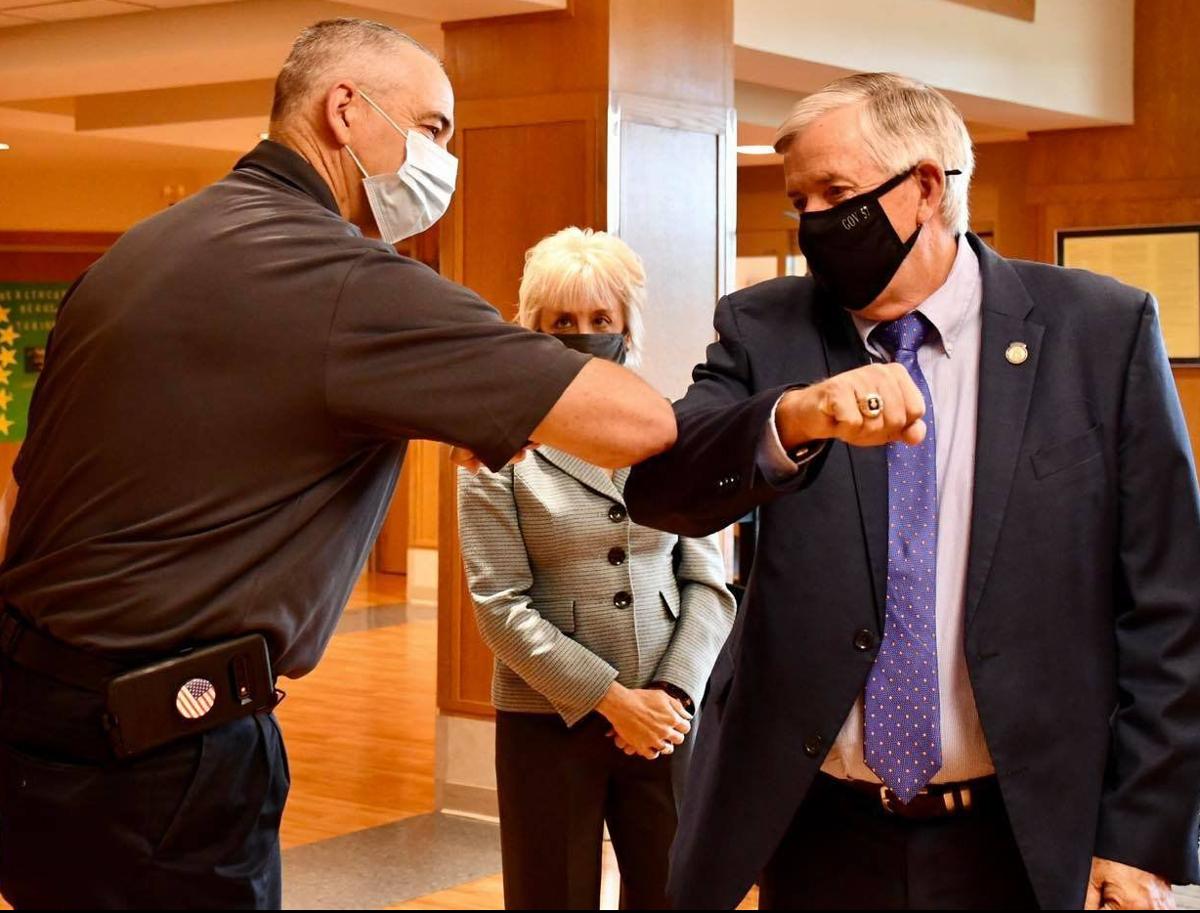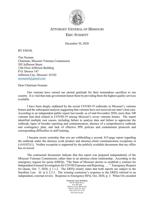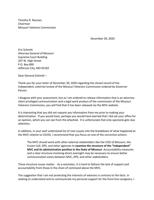The chairman of the Missouri Veterans Commission blocked the public release of a report investigating the deaths of veterans to protect his personal liability. Instead, he might have created some.
ThatŌĆÖs the conclusion of Attorney General Eric Schmitt, who on Wednesday asked Tim Noonan, the chairman of the commission, to release the 415-page investigation. The Armstrong Teasdale law firm conducted the investigation into COVID-19-related deaths of more than 100 Missouri veterans at the seven nursing homes the state runs. was made public the next day.
ŌĆ£I became aware yesterday that you are withholding a second, 415-page report regarding the outbreak under the attorney work product and attorney-client communication exceptions in (the Missouri Sunshine Law). Neither exception is supported by the publicly available documents that my office has reviewed,ŌĆØ Schmitt wrote.
People are also reading…
Noonan had denied my Sunshine Law request for the document. Schmitt became aware of the situation after I wrote about it.
ŌĆ£You have been quoted as saying that if the attorney general directs you to release the report, you would be happy to release it,ŌĆØ Schmitt wrote. ŌĆ£Based on the publicly available documents that we have reviewed that undercut the applicability of (the attorney-client privilege exception), you should release the report.ŌĆØ
The most important story here is about veterans who died from COVID-19, many of whom might have been saved with quicker and more coordinated state action. But thereŌĆÖs a sub-story that is also important because it contains lessons to guide government officials in the future.
The stateŌĆÖs Sunshine Law exists precisely for these moments, to provide public accountability when government fails. All too often, government officials ŌĆö elected and appointed ones ŌĆö fail to recognize the importance of transparency for what turn out to be selfish reasons.
Noonan had told various government officials that he was holding back the report in part because he feared lawsuits based on the reportŌĆÖs contents.
ŌĆ£I have personal assets that I do not want targeted by a plaintiffŌĆÖs lawyer,ŌĆØ Noonan, a ├█č┐┤½├Į businessman and former Boeing executive, told Sarah Steelman, head of the Office of Administration, in an email on Nov. 20. But his actions, Schmitt told him, might have made his legal sledding more slippery.
ThatŌĆÖs because the use of the stateŌĆÖs legal defense fund is only available for state employees and appointees if they cooperate with the state in trying to avoid litigation. Noonan actually challenged somebody to sue him for the document, a threat that two local attorneys who specialize in Sunshine Law, Elad Gross and Mark Pedroli, said they were prepared to answer.
ŌĆ£You also have been quoted as welcoming litigation to determine if the report is not legal work product. If your failure to release the report results in litigation, my office will consider your failure to be due to a lack of cooperation with this office,ŌĆØ Schmitt wrote.
But thereŌĆÖs another reason why itŌĆÖs important for public officials to take the stateŌĆÖs open meetings and open records laws more seriously, says Pedroli, founder of the Sunshine and Government Accountability Project.
ItŌĆÖs because the Sunshine Law itself creates personal liability for government officials who choose not to follow it. And it offers protection for those public officials who seek to defend the lawŌĆÖs purpose: government accountability.
ŌĆ£Government officials entertaining the idea of concealing open records in violation of the law should understand the law not only creates personal liability for the wrongdoer, but also immunity for those objecting to the concealment,ŌĆØ Pedroli says.
ThatŌĆÖs what state Sen. Jill Schupp, who like Noonan is a member of the veterans commission, was trying to do. She objected to NoonanŌĆÖs unilateral decision to withhold the document, without a vote of the full Missouri Veterans Commission. Upon discovering that Noonan was denying the document to me, as well as making it difficult for other commissioners to access it, she implored Gov. Mike Parson to get involved, and went public with her complaint.
In the end, sheŌĆÖs pleased that Parson, and Schmitt, agreed with her. For those readers who care about such things, Parson and Schmitt are Republicans. Noonan is an independent. Schupp is a Democrat. Public accountability knows no party.
On Thursday, Noonan agreed to release the full report, which was posted on the commissionŌĆÖs website. He also resigned as the chairman of the commission.
ŌĆ£I am glad the MVC is moving forward in a transparent and lawful way as we support our veterans and staff in the ongoing fight against this deadly pandemic,ŌĆØ Schupp said.
The full report includes a detailed analysis of the outbreak at each of the stateŌĆÖs homes, something that wasnŌĆÖt available in the 53-page summary report that had been previously issued. The report contains allegations by at least one state employee that state officials at the highest level of government were told of COVID-19 outbreaks as early as August, before deaths started piling up at several homes. It tracks the rise of deaths in the veterans homes with the rise of COVID-19 cases in rural counties that lack mask mandates.
The report cites communications failures as one of the key causes of the dozens of deaths. Veterans were the victims.
ŌĆ£Once COVID got into the home,ŌĆØ said one family member of the Cameron veterans home in an interview outlined in the full report, ŌĆ£It was like all hell broke loose.ŌĆØ
The chair of the Missouri Veterans Commission had refused to release the report, but relented on Thursday.
Commissioner, governorŌĆÖs office, accuse Missouri Veterans Commission chairman of violating the Sunshine Law.┬Ā



















